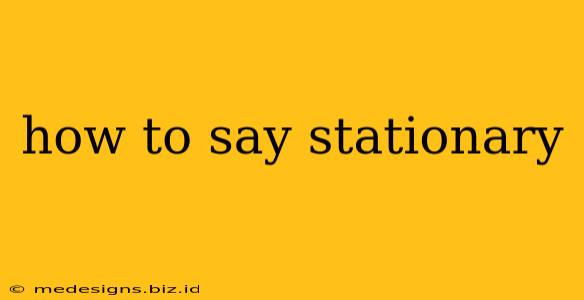How to Say "Stationary" and Avoid Common Mistakes
The word "stationary" is often confused with its homophone, "stationery." Understanding the difference is key to clear communication, both in writing and speaking. This guide will clarify the meaning of "stationary," offer alternative phrasing, and help you avoid embarrassing errors.
What Does "Stationary" Mean?
"Stationary" means not moving; fixed in one place. It describes something that is still or immobile. Think of a stationary object, a stationary bike, or a stationary front.
Here are some examples in sentences:
- The car remained stationary at the red light.
- The soldiers held their positions in a stationary defense.
- The needle on the gauge remained stationary, indicating no change.
Common Mistakes and Alternatives
The most frequent mistake is confusing "stationary" with "stationery," which refers to writing materials like paper, envelopes, and pens. This is a classic case of homophones – words that sound alike but have different meanings and spellings.
If you're unsure whether to use "stationary" or "stationery," consider the context. Are you describing something that's not moving? If so, use "stationary." Are you talking about writing materials? Then use "stationery."
Here are some alternative ways to express the idea of "stationary," depending on the context:
- Immobile: This word directly conveys the lack of movement. Example: "The truck remained immobile in the ditch."
- Still: This is a simple and versatile alternative. Example: "The water remained still in the pond."
- Fixed: This emphasizes the permanence of the position. Example: "The camera was fixed on the subject."
- Unmoving: This highlights the lack of any movement whatsoever. Example: "The sculpture stood unmoving in the gallery."
- Static: This is a more technical term often used in physics or engineering. Example: "The charge remained static."
Tips for Remembering the Difference:
- Think "station": Remember that "stationary" relates to a fixed location or position, like a train station.
- Think "ery": Remember that "stationery" has an "-ery" ending, often associated with places or collections (e.g., bakery, weaponry). This can help you connect it to writing supplies.
Mastering the use of "stationary" will significantly enhance the clarity and precision of your writing and speaking. By understanding its meaning and exploring alternative phrasing, you can confidently avoid confusion and communicate effectively.
